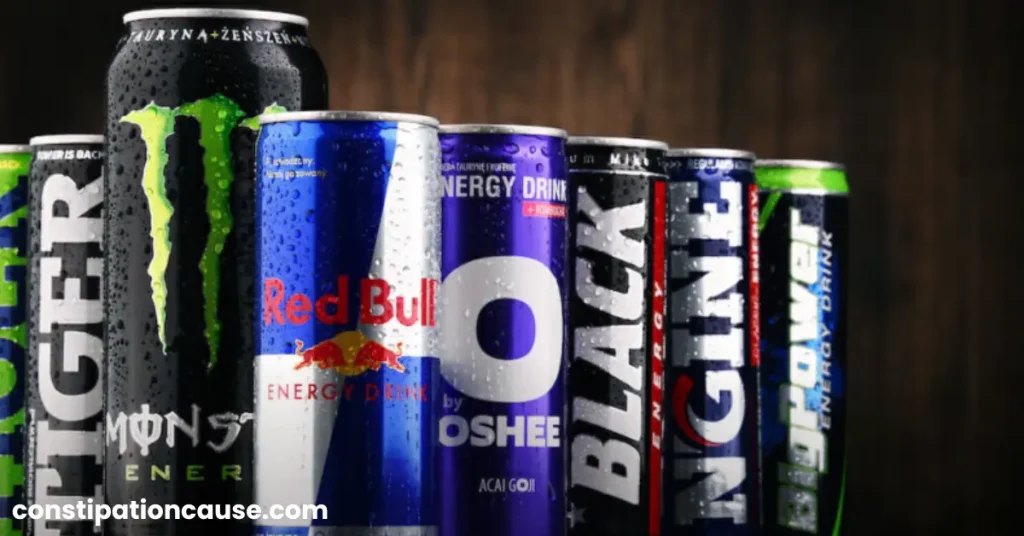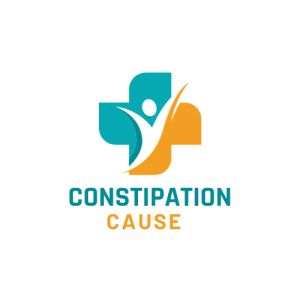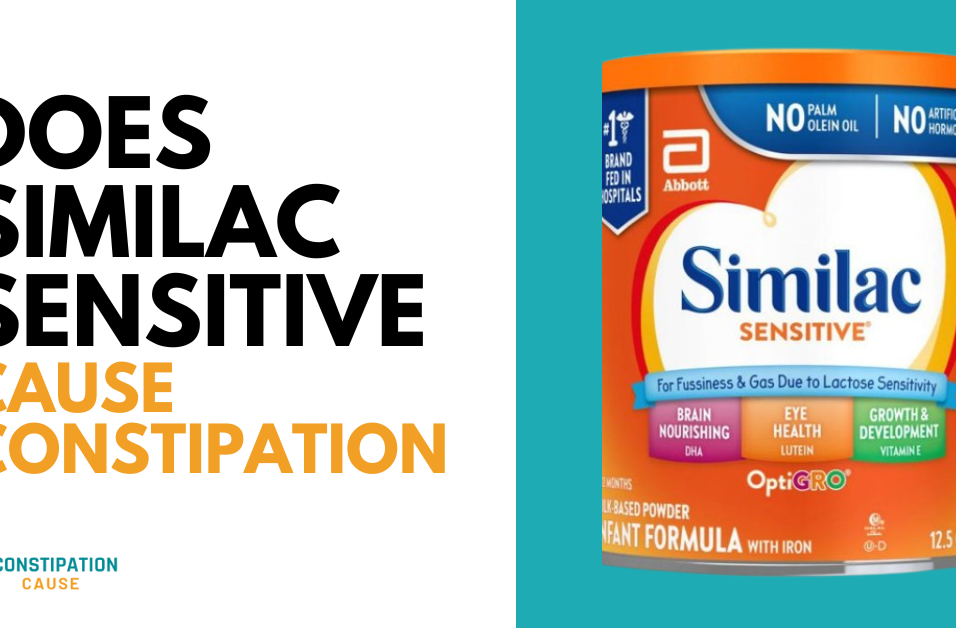Did you know that the United States ranks highest in the consumption of energy drinks?
Well, here’s another fact that there are over 4 million constipation patients in the United States!
With the growing rise in cases of constipation and consumption of energy drinks simultaneously; an intriguing question has arisen: Do energy drinks cause constipation?
This digestive discomfort not only puts a damper on daily life but also poses significant health concerns.
In this eye-opening exploration, we dive deep into the potential relationship between energy drinks and constipation, shedding light on a topic that concerns millions of Americans searching the answer for the question; do energy drinks cause constipation?
So, let’s not waste any time and get started!
Can Energy Drinks Cause Constipation?
Energy drinks are not recognized as a direct cause of constipation, but their consumption can have several indirect effects that may contribute to digestive issues in some individuals. It’s essential to consider these factors and keep in mind that individual reactions can vary significantly. If you suddenly quit your drinking and find it may effect on your digestion health then read this post can quitting drinking cause constipation?
Factors to Consider:
1. Caffeine Content:
Energy drinks often contain high levels of caffeine, a natural stimulant. While caffeine is known for its potential laxative effect in some people, especially in the form of coffee, excessive caffeine intake can lead to dehydration. Dehydration can result in harder stools and less frequent bowel movements, which may contribute to constipation. However, the impact of caffeine on bowel movements can vary from person to person.
2. Sugar Content:
Many energy drinks are laden with added sugars. Excessive sugar consumption can lead to fluctuations in blood sugar levels, which might affect digestive processes. Some individuals may experience gastrointestinal discomfort, including constipation, when consuming large amounts of sugar.
3. Hydration Status:
Energy drinks are often consumed in place of water or other hydrating beverages. Insufficient hydration is a common contributor to constipation, as it can lead to dry and hard stools. If individuals do not compensate for the diuretic effect of caffeine by drinking enough water, they may be at a higher risk of dehydration-related constipation.
4. Diet and Lifestyle:
Constipation is a multifactorial issue influenced by diet and lifestyle choices. A diet low in fiber, high in processed foods, or lacking in fruits and vegetables can contribute to constipation. Sedentary lifestyles and a lack of physical activity can also slow down digestive processes.
Individual Variability:
It’s crucial to recognize that digestive issues caused by energy drinks may not be concerning for each and every individual.
Some people may be more susceptible to the dehydrating effects of caffeine, while others may experience digestive discomfort due to sugar content. The impact of energy drinks on digestive system or bowel habits can range from none to significant discomfort, depending on an individual’s overall health, hydration status, dietary choices, and caffeine tolerance.
Composition of Energy Drinks
Energy drinks have become a common part of modern life, often consumed to combat fatigue and boost alertness. These beverages typically contain a variety of ingredients designed to provide a quick energy boost. Among the key components found in energy drinks, caffeine stands out as a central player.
1. Caffeine:

Caffeine is the primary active ingredient in most energy drinks and is responsible for their stimulating effects. It’s a natural compound found in coffee beans, tea leaves, and cacao, but in energy drinks, it’s often present in higher concentrations. Caffeine acts as a central nervous system stimulant, and its role in energy drinks is twofold: to enhance alertness and combat fatigue.
Stimulant Effect of Caffeine
Caffeine exerts its stimulating influence by blocking adenosine receptors in the brain. Adenosine is a neurotransmitter that promotes sleepiness and relaxation. When caffeine interferes with adenosine’s action, it increases the release of other neurotransmitters, such as dopamine and norepinephrine, which are associated with increased wakefulness, alertness, and improved mood. This is why consuming caffeine can provide a quick and potent energy boost, helping individuals feel more awake and focused.
Caffeine’s Impact on the Digestive System
While caffeine’s energizing properties are well-known, its impact on the digestive system is less often discussed. Here are some ways in which caffeine can affect the gastrointestinal tract:
- Stimulation of Gastric Acid: Caffeine can stimulate the secretion of gastric acid in the stomach. This increased acid production may lead to a more acidic environment in the stomach, potentially affecting digestion and contributing to gastrointestinal discomfort in some individuals.
- Diuretic Effect: Caffeine is also a diuretic, meaning it can increase urine production. This diuretic effect may lead to dehydration if not compensated by adequate fluid intake, potentially affecting bowel movements.
- Gastrointestinal Irritation: In some cases, excessive caffeine intake may irritate the lining of the gastrointestinal tract, leading to symptoms such as stomachaches, cramps, or even diarrhea.
It’s important to note that the effects of caffeine on the digestive system can vary from person to person. Some individuals may be more sensitive to caffeine’s gastrointestinal effects, while others may experience minimal disruption.
2. Sugar:
Sugar is a common ingredient in energy drinks, contributing to their sweet taste and providing a quick source of energy. However, the high sugar content in these beverages can have several potential effects on digestion:
- Blood Sugar Spikes and Crashes: Energy drinks often contain a significant amount of added sugars, which can lead to rapid spikes in blood sugar levels shortly after consumption. This sudden increase in blood sugar is typically followed by a subsequent crash, which can leave individuals feeling fatigued and irritable. These fluctuations in blood sugar can disrupt the body’s normal digestive processes and may contribute to feelings of discomfort or unease in some individuals.
- Gastrointestinal Discomfort: High sugar intake can lead to gastrointestinal discomfort, including bloating, gas, and diarrhea. The rapid fermentation of sugars by gut bacteria can produce excess gas, leading to abdominal discomfort. Furthermore, the osmotic effect of sugar can draw water into the intestines, potentially causing diarrhea or loose stools.
- Impact on Gut Micro biota: Excessive sugar consumption can alter the composition of the gut micro biota, the community of beneficial bacteria in the digestive tract. This disruption can affect the balance of gut bacteria and may contribute to digestive issues. An imbalance in gut micro biota has been associated with conditions like irritable bowel syndrome (IBS) and other gastrointestinal disorders.
The Link between High Sugar Intake and Gastrointestinal Issues:
The connection between high sugar intake and gastrointestinal problems is well-documented. Excessive sugar consumption can lead to the following gastrointestinal issues:
- Bloating and Gas: Sugars are rapidly fermented by gut bacteria, producing gas as a byproduct. This gas can accumulate in the intestines, leading to bloating and flatulence.
- Diarrhea: High sugar intake can lead to an osmotic effect, drawing water into the intestines. This can result in loose stools or diarrhea.
- Gut Dysbiosis: Excessive sugar consumption can disrupt the balance of gut microbiota, potentially contributing to conditions like irritable bowel syndrome (IBS), inflammatory bowel disease (IBD), and other digestive disorders.
- Gastro esophageal Reflux Disease (GERD): Some sugary energy drinks may have a low pH, which can contribute to acid reflux or GERD in susceptible individuals. Acid reflux can lead to heartburn and discomfort in the upper digestive tract.
3. Amino Acids:
Amino acids, the building blocks of proteins, are sometimes added to energy drinks to enhance their effects on the body. One such amino acid commonly found in energy drinks is taurine. Taurine is a non-essential amino acid, meaning the body can produce it on its own, but it’s also obtained through diet and supplementation. Here, we’ll explore the effects of taurine on the body and any potential digestive implications.
Effects of Taurine on the Body:
- Mental Alertness: Taurine is believed to have a role in promoting mental alertness and cognitive function. It may help improve concentration and memory, which can contribute to increased mental clarity and focus after consuming an energy drink.
- Physical Performance: Taurine is sometimes included in energy drinks for its potential to enhance physical performance. It may help reduce muscle fatigue, improve endurance, and support muscle contraction, making it appealing to athletes and those seeking a physical energy boost.
- Cardiovascular Health: Taurine has been studied for its potential cardiovascular benefits, including its ability to help regulate blood pressure and reduce the risk of heart disease. It may promote better circulation and heart health.
Potential Digestive Implications:
While taurine is generally considered safe for most people when consumed in moderate amounts, there are limited studies on its direct impact on digestion. However, here are some considerations:
1. Gastrointestinal Sensitivity:
Some individuals may have gastrointestinal sensitivity to certain amino acids, including taurine. High doses of taurine, especially when consumed rapidly in energy drinks, may potentially lead to stomachaches, cramps, or discomfort in susceptible individuals.
2. Interaction with Other Ingredients:
Energy drinks contain a combination of ingredients, and it’s possible that taurine may interact with other compounds in these beverages, affecting how the digestive system processes them. For example, interactions between taurine and caffeine could potentially influence digestive processes in some individuals.
3. Individual Variation:
As with many dietary components, individual responses to taurine can vary widely. Some people may experience digestive discomfort when consuming taurine-containing energy drinks, while others may not notice any adverse effects.
4. Vitamins and Minerals:
Vitamins and minerals are often added to energy drinks to enhance their nutritional profile and provide potential health benefits. These additives are typically included in the form of water-soluble compounds, making them easy to mix into the liquid. Here’s a brief overview of the process:
5. Formulation:
Beverage manufacturers carefully formulate energy drinks to include specific vitamins and minerals. These formulations are based on desired nutritional goals and marketing strategies.
6. Selection of Ingredients:
High-quality sources of vitamins and minerals are selected to ensure the product’s effectiveness and safety. These sources can include synthetic forms of vitamins and minerals or naturally derived alternatives.
7. Fortification:
During the manufacturing process, the selected vitamins and minerals are added to the energy drink. This may involve mixing them into the liquid base or dissolving them in water to create a premix that is then blended into the final product.
8. Quality Control:
Rigorous quality control measures are implemented to ensure that the desired nutrient levels are achieved and that the additives are evenly distributed throughout the beverage.
Influence of Certain Additives on Digestion:
The impact of vitamins and minerals on digestion primarily depends on the type and quantity of these additives in energy drinks. Here are some considerations:
1. Vitamin B Complex:
Energy drinks often contain B vitamins, including B1 (thiamine), B2 (riboflavin), B3 (niacin), B5 (pantothenic acid), B6 (pyridoxine), B9 (folate), and B12 (cobalamin). These vitamins play essential roles in energy metabolism and are generally well-tolerated. In moderate amounts, they are unlikely to have significant digestive implications.
2. Vitamin C:
Vitamin C (ascorbic acid) is another common addition to energy drinks. It is known for its antioxidant properties and immune system support. While vitamin C is generally safe, very high doses may cause digestive discomfort, such as diarrhea or stomach cramps, in some individuals.
3. Minerals:
Minerals like magnesium and calcium are essential for various bodily functions, including muscle and nerve function. In moderate amounts, they are generally well-tolerated and should not cause digestive issues. However, excessive intake of certain minerals, such as magnesium, can lead to diarrhea and gastrointestinal discomfort.
4. Artificial Sweeteners and Flavorings:
Some energy drinks may contain artificial sweeteners and flavorings, which can impact digestion in individuals with sensitivities. Certain sweeteners, like sugar alcohols (e.g., sorbitol or xylitol), can lead to bloating, gas, and diarrhea when consumed in large quantities.
5. Caffeine Interaction:
The interaction between vitamins, minerals, and caffeine (a common ingredient in energy drinks) can influence digestion. Caffeine may increase the absorption of certain vitamins and minerals while affecting others negatively. For example, caffeine can enhance calcium absorption but may decrease iron absorption.
Do Caffeine Drinks Induce Constipation?
Caffeine, a central component of many energy drinks, is known for its stimulant properties and its potential to affect various bodily functions, including the gastrointestinal system. While caffeine is more commonly associated with a laxative effect, it can have contrasting impacts on the gut, and its potential to induce constipation should be examined in detail.
Effects of caffeine-rich drinks on constipation:
- Laxative Effect: Caffeine, in moderate amounts, is known to stimulate the muscles of the digestive tract, promoting bowel movements. This stimulation is often associated with the urge to have a bowel movement shortly after consuming caffeine-containing beverages, such as coffee. As a result, caffeine is often perceived as having a laxative effect.
- Increased Stool Softness: Caffeine can lead to increased water secretion in the colon, which can soften stools and make them easier to pass. This is one reason why caffeine is often considered a bowel stimulant.
- Gut Motility: Caffeine can increase the contractions of the colon, potentially speeding up the transit of stool through the digestive tract. This can reduce the risk of constipation in some individuals.
Individual Variability:
Despite its potential laxative effects, caffeine’s impact on the gut can vary from person to person. Some individuals may experience more pronounced bowel stimulation and softer stools after consuming caffeine, while others may not notice any significant change in their bowel habits.
Dehydration Concerns:
One potential way in which caffeine could contribute to constipation is through its diuretic effect. Caffeine can increase urine production, leading to fluid loss if not compensated for by adequate hydration. Dehydration can result in harder stools and slower transit through the digestive tract, potentially leading to constipation.
Do energy drinks result in gastrointestinal problems?
Energy drinks have gained popularity for their ability to provide a quick energy boost, but their consumption may have implications for bowel health and the gastrointestinal system. While research in this area is limited and ongoing, there is some evidence suggesting a potential link between energy drinks and gastrointestinal problems. On the other hand, drink hard water can cause constipation or digestive problems explore it and get the answer of your problem.
Potential Gastrointestinal Issues Associated with Energy Drinks:
- Constipation: Although not a direct cause, the caffeine content in energy drinks can sometimes lead to dehydration, which may contribute to constipation. Dehydration can result in harder stools and less frequent bowel movements.
- Diarrhea: In some cases, the high sugar content and caffeine in energy drinks, when consumed excessively or on an empty stomach, can lead to gastrointestinal distress, including diarrhea.
- Gastrointestinal Discomfort: Some individuals may experience stomachaches, cramps, or bloating after consuming energy drinks. The combination of caffeine, sugar, and other additives can be harsh on the digestive system for some people.
- Acid Reflux: The acidity of certain energy drinks may contribute to acid reflux or gastro esophageal reflux disease (GERD) symptoms in susceptible individuals. This can lead to heartburn and discomfort in the upper digestive tract.
Research on Energy Drinks and Gastrointestinal Problems:

Some studies have explored the potential link between energy drinks and gastrointestinal issues:
- Dehydration and Constipation: Research has suggested that excessive caffeine consumption, such as that found in energy drinks, can lead to dehydration. Dehydration, in turn, may result in constipation or exacerbate existing constipation issues.
- Stomach Discomfort: A few studies have indicated that the combination of caffeine and other ingredients in energy drinks can lead to stomach discomfort, including bloating and cramps, in some individuals.
- Gut Micro biota: Some research has suggested that the high sugar content in energy drinks may negatively impact the balance of gut micro biota. An imbalance in gut bacteria can potentially lead to gastrointestinal problems.
Can Red Bull Cause Constipation?
Red Bull, like many other energy drinks, contains ingredients such as caffeine and sugar that can potentially contribute to constipation in some individuals. It’s important to consider that the effects of Red Bull on bowel habits are not unique to this brand, and similar effects can be seen with other energy drink brands.
Ingredients to Watch Out For:
Certain ingredients commonly found in energy drinks may contribute to digestive issues:
- Caffeine: High caffeine intake can lead to dehydration, which may result in constipation.
- High Sugar Content: Excessive sugar consumption can disrupt blood sugar levels and, in some cases, contribute to gastrointestinal discomfort and constipation.
- Artificial Sweeteners: Some energy drinks contain artificial sweeteners, which can lead to bloating, gas, and diarrhea in sensitive individuals.
- Acidity: The acidity of energy drinks may exacerbate acid reflux or heartburn in susceptible individuals.
Regular Consumption of Energy Drinks:
Regular and excessive consumption of energy drinks can potentially exacerbate digestive problems:
- Dehydration: Daily intake of energy drinks, especially without adequate water consumption, can lead to chronic dehydration, increasing the risk of constipation.
- Impact on Gut Health: Consistent consumption of high-sugar and high-caffeine beverages may disrupt the balance of gut micro biota, potentially leading to digestive issues.
Advice on Moderation and Healthy Alternatives:
To minimize the risk of digestive problems associated with energy drinks:
- Moderation: Consume energy drinks in moderation, if at all, and be mindful of your individual tolerance to caffeine and sugar.
- Stay Hydrated: Offset the diuretic effects of caffeine by drinking plenty of water throughout the day.
- Balanced Diet: Maintain a diet rich in fiber, fruits, and vegetables to support healthy digestion.
- Healthy Alternatives: Consider alternatives such as herbal teas, water, or beverages with lower caffeine and sugar content to boost energy levels.
Digestive Health Tips for Energy Drink Consumers
In today’s fast-paced world, energy drinks have become a popular choice for those seeking a quick energy boost. However, while these beverages can offer temporary vitality, they may also bring about unwelcome digestive discomfort. This article aims to provide essential guidelines for maintaining good digestive health while still enjoying energy drinks. Whether you’re an occasional consumer or rely on these drinks regularly, read on to discover ways to support your digestive system.
Here are a few digestive health tips for energy drink consumers:
1. Stay Hydrated:
Counteract the diuretic effects of caffeine by drinking water alongside energy drinks. Aim for at least 8-10 glasses of water daily to stay properly hydrated.
2. Choose Wisely:
Opt for energy drinks with lower sugar content. Excessive sugar can disrupt blood sugar levels and potentially lead to digestive discomfort.
3. Fiber-Rich Diet:
Incorporate plenty of fiber-rich foods like fruits, vegetables, whole grains, and legumes into your diet. Fiber supports regular bowel movements and helps prevent constipation.
4. Mindful Consumption:
Practice moderation. Understand your caffeine tolerance and limit energy drink consumption accordingly. Overindulgence can lead to digestive issues.
5. Herbal Alternatives:
Consider herbal teas or natural energy boosters like green tea for a gentler source of vitality. These alternatives are often kinder to the digestive system.
6. Balanced Diet:
Maintain a balanced diet with a variety of nutrients. Avoid relying solely on energy drinks for nutrition, as a diverse diet supports overall health, including digestive health.
7. Medication Awareness:
Be aware of potential interactions between energy drinks and medications you may be taking. Consult with a healthcare professional if you have concerns.
8. Listen to Your Body:
Pay attention to how your body responds to energy drinks. If you notice digestive discomfort or irregularities, consider reducing or eliminating their consumption.
9. Rest and Sleep:
Adequate rest and sleep are vital for digestive health. Energy drinks should not replace the need for quality sleep, which is essential for overall well-being.
10. Consult a Professional:
If digestive problems persist or worsen despite following these tips, consult a healthcare provider for a thorough evaluation and personalized guidance.
Incorporating these guidelines into your lifestyle can help you enjoy the benefits of energy drinks while safeguarding your digestive health. Remember that moderation and balance are key to maintaining overall well-being in your quest for sustained vitality.
Conclusion:
In conclusion, energy drinks can impact digestive health, leading to constipation and other issues. It’s essential to be mindful of individual reactions and practice moderation. To support your digestive system, maintain a balanced diet, stay hydrated, and consider alternatives like herbal teas or water when energy is needed. Remember, your health is paramount, so make informed choices about energy drink consumption for the well-being of your digestive system and overall health. I hope this article answered your question: ‘Do energy drinks cause constipation’.
Frequently Asked Questions
Can energy drinks cause other digestive issues besides constipation?
Yes, while constipation is a common concern, energy drinks may also lead to other digestive problems, including diarrhea, stomach cramps, and bloating. These issues can vary from person to person.
Is there a recommended limit to how many energy drinks I should consume per week?
There’s no universally recommended limit, as tolerance varies among individuals. However, it’s advisable to moderate consumption and consider your caffeine tolerance, overall health, and hydration levels.
Can I offset the potential constipating effects with certain foods?
Yes, incorporating a fiber-rich diet with fruits, vegetables, and whole grains can help alleviate constipation. Also, drink plenty of water to counteract the dehydrating effects of caffeine.
Are there energy drinks marketed as digestive-friendly?
While some products claim to be gentler on the stomach, it’s crucial to read labels and evaluate their ingredients. The best approach is to select options with lower sugar and caffeine content.
Can energy drinks interact with medications and worsen digestive problems?
Energy drinks can interact with certain medications and exacerbate digestive issues. Consult with a healthcare professional if you’re taking medications, and consider their potential interactions.









Leave feedback about this